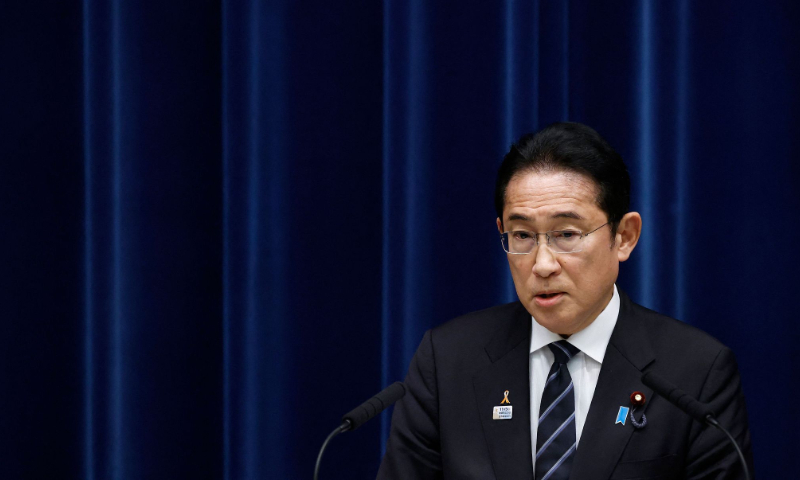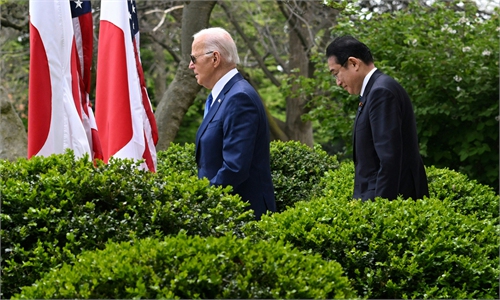Japan to use PALM10 to economically entice, politically and militarily pressure PICs, but effects limited: experts

Japan's Prime Minister Fumio Kishida speaks during a news conference at the prime minister's official residence in Tokyo on November 2, 2023. Photo: VCG
With apparent backing from the US, Japan is looking to increase its security engagement in the South Pacific region, which is seen by the US and its allies as a key battleground against China's influence, as it prepares to host the 10th Pacific Islands Leaders Meeting (PALM10) from Tuesday to Thursday.
However, Chinese analysts believe Japan and the US will find it difficult to impose their strategic intentions on the Pacific Island countries (PICs), as the majority of those island nations do not want to, and will not, follow Japan or other former colonial powers in containing China or reducing mutually beneficial cooperation with it.
Japan's Ministry of Foreign Affairs announced Monday that representatives from the 18 Pacific Islands Forum (PIF) members and Japan will attend the meeting.
According to a draft declaration for the meeting released Saturday, PALM10 will emphasize the alignment of Japan's cooperation with seven themes - such as global peace and security - included in the 2050 Strategy Implementation Plan.
The Japan Times revealed on July 10 that the meeting will also emphasize cooperation with PICs to promote the so-called rule of law, "in order to keep China in check."
Japan's motivation in reaching out to the PICs has always been very clear, analysts said.
"Firstly, Japan aims to strengthen its relations with countries in the region in order to access the abundant natural resources, including fisheries and deep-sea resources. Secondly, Japan seeks to enhance its alliance with the US to counteract China's equal and mutually beneficial cooperation with South Pacific countries, thereby stirring up strategic tensions between the US and China," Yu Lei, a professor at the Department of International Politics and Economics at Shandong University, told the Global Times on Monday.
Through hosting the meeting, Japan wants to provide military security assistance to strengthen military control over the island nations, and expand its military presence in the region, Yu predicted.
Chen Hong, director of the Australian Studies Center of East China Normal University, told the Global Times that from the draft declaration, it can be seen that Japan is trying to impose its strategic intentions on the PICs.
The draft even mentions the issue of the Korean Peninsula situation, which has no direct relevance to the PICs. Meanwhile, the issue of climate change, which is of utmost concern to the PICs , is glossed over in the draft, while the so-called "acknowledgment" of Japan's handling of nuclear-contaminated wastewater is included, Chen said.
"It is obvious that Japan hopes to use 60 billion yen in aid funds to win over some countries to support its national intentions and geopolitical strategies," he added, when commenting on the announcement that Japanese Prime Minister Fumio Kishida is expected to announce over $380 million (60 billion yen) in development aid over the next three years.
Serving the US' "Indo-Pacific Strategy," Japan, as the main player of the US-led games in the region, wants to align those PICs to specifically target China, Russia, and North Korea, said Lü Chao, an expert on the Korean Peninsula issue at the Liaoning Academy of Social Sciences.
Ironically, Japan claims to prioritize peace and security in the region, but its efforts to enhance defense cooperation with PICs reveal a hidden agenda of expanding its military presence beyond its borders, Lü shared with the Global Times on Monday.
Obviously, with the backing of the US, Japan will continue to economically entice and politically and militarily pressure island nations. PALM10 is destined to intensify the competition among major powers in the Pacific region, disrupt the region's peace and stability, and undermine the positive momentum of deepening and strengthening economic and trade cooperation, Yu said.
However, the effects of the meeting will not be significant because island nations have learned from centuries of interaction with their former colonial powers that they cannot rely on them, Yu noted.

